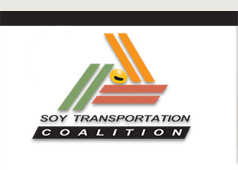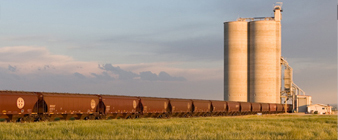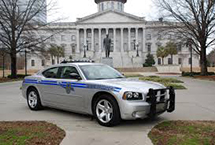 |
 |
|
| eNews • May 2015 | ||
| Promoting a Cost-Effective, Reliable and Competitive Transportation System |
||
 Trucking and Rail Industries Turn State Troopers Into Unwitting Lobbyists
Trucking and Rail Industries Turn State Troopers Into Unwitting Lobbyists
WASHINGTON - David Latimer, wearing a South Carolina Highway Patrol button on his lapel, was working Capitol Hill one recent morning, warning of the dangers of longer and heavier trucks on the nation’s highways.
“If you have a bad truck accident, more of them are going to involve fatalities,” said Mr. Latimer, who passed out his card as the vice chairman of the National Troopers Coalition, which represents 45,000 law enforcement officers.
What he did not highlight was that he was being paid by a nonprofit group financed by the railroad industry, which stands to lose billions of dollars if the trucking industry is allowed to carry larger loads.
This fight is playing out as Congress prepares to take up renewal of the Highway Trust Fund, which finances billions of dollars in projects for road construction, bridge repair and other infrastructure programs. The fund runs out of money May 31.
While the trucking industry will look for a way to insert language into the highway funding bill that allows bigger trucks, the railroad industry will be fighting to quash such a move.
Each side has marshaled facts to buttress its argument. The trucking industry says longer or heavier trucks would mean fewer trucks on the road, actually reducing accidents. The rail industry has data suggesting that bigger trucks cause more accidents and do more damage to roads.
What stands out in this transportation battle is how law enforcement officers are being used as lobbying surrogates to make contradictory arguments in the name of public safety.
And those highly unusual tactics are already having consequences. After inquiries from The New York Times, Mr. Latimer was forced out from his post at the National Troopers Coalition.
But both sides are using tactics that could be seen as deceptive. The railroad industry, through an organization called Coalition Against Bigger Trucks, has paid the airfare and hotel bills for Mr. Latimer, a retired South Carolina state trooper, to come to Washington, and it has done the same for police chiefs, state troopers and sheriffs from states including Michigan, Ohio and Texas. It even put Mr. Latimer on its payroll, compensating him nearly $70,000 a year.
For its part, the trucking industry, which includes major carriers like FedEx and UPS, has paid a scholar at a university institute to produce a report, which found that trucks with twin, 33-foot trailers would be more stable than the twin, 28-foot trailers now allowed on federal roadways. But in a fact sheet the trucking industry group put out last month, it did not make it clear that this was an industry-funded report. And it has recruited its own law enforcement officers to counter the likes of Mr. Latimer. But one Montana state trooper said the trucking industry had falsely attributed quotations to him in a document it is circulating.
“It is the big boys fighting the big boys,” said Joan Claybrook, a former head of the National Highway Traffic Safety Administration, who has watched the campaigning escalate in the past month. “And it is utterly amazing how much money they will burn, and the tricks they will use on both sides to get their message to a key member of Congress.”
The intensity of the battle is a reflection of the enormous financial stakes. The railroad industry could lose $6 billion in annual revenue if heavier trucks are allowed on the nation’s highways, one internal industry estimate says. That is where the law enforcement officers come in.
“Quite frankly, 95 percent of the members of Congress don’t want to hear from a lobbyist,” said Mr. Latimer, who still serves as the executive director of the South Carolina Troopers Association. “A sheriff, a trooper, a chief of police; if the message is coming from them, it makes it much more likely they will listen.”
But the role that the different industry groups have played has not always been clear.
Three of the four law enforcement officials interviewed by The Times who went to Washington said they believed that heavier or longer trucks were a bad idea, but they did not know of the railroad industry’s role in footing the bill for their trip.
“The railroad industry is involved?” said Brian Hawthorne, the sheriff of Chambers County in Texas, whose travel expenses were paid by the Coalition Against Bigger Trucks, which is primarily funded by the Association of American Railroads.
“The picture is not always as it seems,” said Tim Hazlette, the chief of police in Campbellsville, Ky., who also said he was unaware that the industry effectively bankrolled his trip, at least until after he arrived in Washington to lobby members of Congress.
Shane Reese, a spokesman for the Coalition Against Bigger Trucks, said the group did not try to hide the rail industry’s central role in the group. But it does not mention on its website or its lobbying fact sheets that the railroad industry is its almost exclusive source of funding, or that it shares office space with a railroad industry advocacy group, GoRail.
To counter the rail industry, major shipping companies recently formed the Coalition for Efficient & Responsible Trucking, which is pushing the plan to allow longer trucks.
The group has publicly disclosed its financial backers. It also is passing out a release that quotes a report produced by a prominent University of Michigan transportation researcher, John Woodrooffe, saying that longer trucks might be safer. But the fact sheet does not note that FedEx commissioned the report. “My preference,” Mr. Woodrooffe said in an interview, “is for full and clear disclosure” of these ties.
After The Times asked about the matter, a full copy of the report, which discloses the industry’s role in funding Mr. Woodrooffe’s research, was put in a more prominent spot on the trucking organization’s website.
A series of commentaries supporting the trucking industry have run recently in various Washington publications, written by Steve Pociask, the president of the American Consumer Institute, and Brigham McCown, a former general counsel at the Federal Motor Carrier Safety Administration.
The articles do not note that Mr. McCown runs a consulting firm that has advised transportation industry clients, and says on his website that he can use “all of the communications tools available today to efficiently deliver our clients’ messages to target audiences.” Reached by phone, he hung up when asked to comment.
Mr. Pociask, in an interview, acknowledged that he had spoken with DCI Group, a Washington consulting firm that the trucking industry has retained to help generate support for the proposal to increase truck lengths. But he said Wednesday that he “did not take any money from any group or person in connection with this activity.”
The trucking industry has also enlisted law enforcement officers, like Brian Inman, the president of the Association of Montana Troopers.
Mr. Inman was asked to sign a letter endorsing the longer trucks - calling the move good for highway safety - a letter that was then sent to the Montana congressional delegation and the United States Department of Transportation, one of the industry lobbyists involved in the effort said. But when read a quotation from the letter, Mr. Inman said that although he agreed with the conclusions, industry advocates made up the lines attributed to him.
“They just added words I did not say,” he said.
Ms. Claybrook, who runs a nonprofit group, Citizens for Reliable and Safety Highways, which is not supported by either industry, said she remained convinced that heavier and longer trucks would in fact make highways less safe.
“It is very hard to fight these battles and do double-checks on all the claims and counterclaims being made,” she said. “But that is the nature of Washington - the way the game is played.”
But it is a game that has disturbed at least some law enforcement officers who have been courted.
Leaders at the nonprofit National Troopers Coalition recently confronted Mr. Latimer and asked him to resign from its executive board after concluding his dual role represented a conflict of interest, said Andrew Matthews, a Connecticut State Police sergeant who recently became the group’s chairman.
“This is inappropriate,” Mr. Matthews said in an interview. “I don’t care if you’re selling insurance or working for some private company. You should disclose who you are employed by and who you represent.”
Correction: April 1, 2015
An earlier version of this article misspelled the surname of a University of Michigan transportation researcher. He is John Woodrooffe, not Woodroofe.
Source: New York Times
Soy Transportation Coalition |
|
